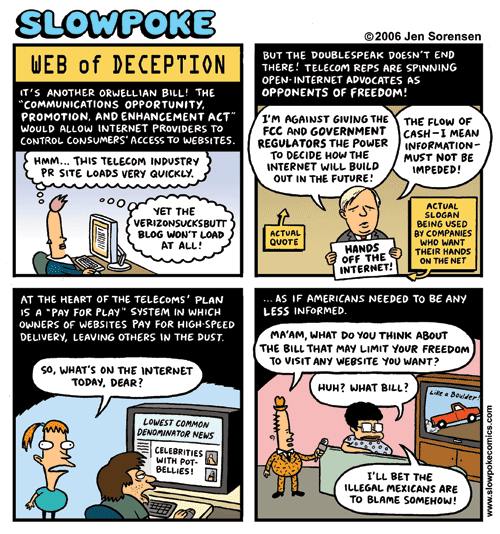ISP’s, and the art of the double-sided CRTC arguments
I got an e-mail today referring to this article about Rogers and Shaw’s CRTC presentations. In specific the e-mail asked whether the quote, “ISPs are pipes, not broadcasters,” by Ken Engelhart, Rogers’ head of regulatory affairs – meant that ISP’s were conceding that net neutrality was, in fact, the preferred practise for ISP’s in this country.
I think there’s two important things to remember here:
1. Everything being said at the current CRTC hearings has been in respect to the issue of promoting Canadian new media content. In particular the CRTC is investigating whether (amongst other things) an ISP levy should be used to encourage Canadian new media growth the same way Canadian broadcasters pay a levy to go into a fund to support the production of Canadian television, or radio stations pay into a fund to support the production of Canadian music. In this theatre the ISP’s absolutely don’t want to be seen as “broadcasters” because they then have a president obligation to promote the development of Canadian content – it’s in their advantage to play the “we’re just a utility” card.
2. “But Brad” you ask, “how can they then turn around in several days, at the upcoming Net Neutrality hearings, and argue the exact opposite?” The important thing to remember in that, epxected, outcome is that Bell’s argument for traffic manipulation in that case is to “protect the network”. It’s not necessarily that the ISP’s want prioritize some content over others – they’re arguing that the strain on their networks is significantly more than capacity and they must have the right to defend it. It’s mere coincidence that the only tool they have to do that, is to prioritize some content over others.
Even if their logic was 100% verifiable fact (and I’ve pointed out elsewhere in my posts about these arguments that there’s much bigger network issues than BitTorrent traffic, or the so-called “high volume users”) my core argument has been that it doesn’t matter what the reasoning is. The moment you allow any traffic prejudice for any reason, the fight is lost, because you’ll never have network transparency again. And that’s simply too much power to hand over to anyone, no matter how noble their rationale is (or isn’t). “Net Neutrality” is a bubble – once it’s punctured it can’t be reconstructed. You can’t just violate it “to protect network integrity” and assume that it will stand for content priority, or end-user access, or equal access against ISP-affiliated services – it really is an all or nothing deal.




